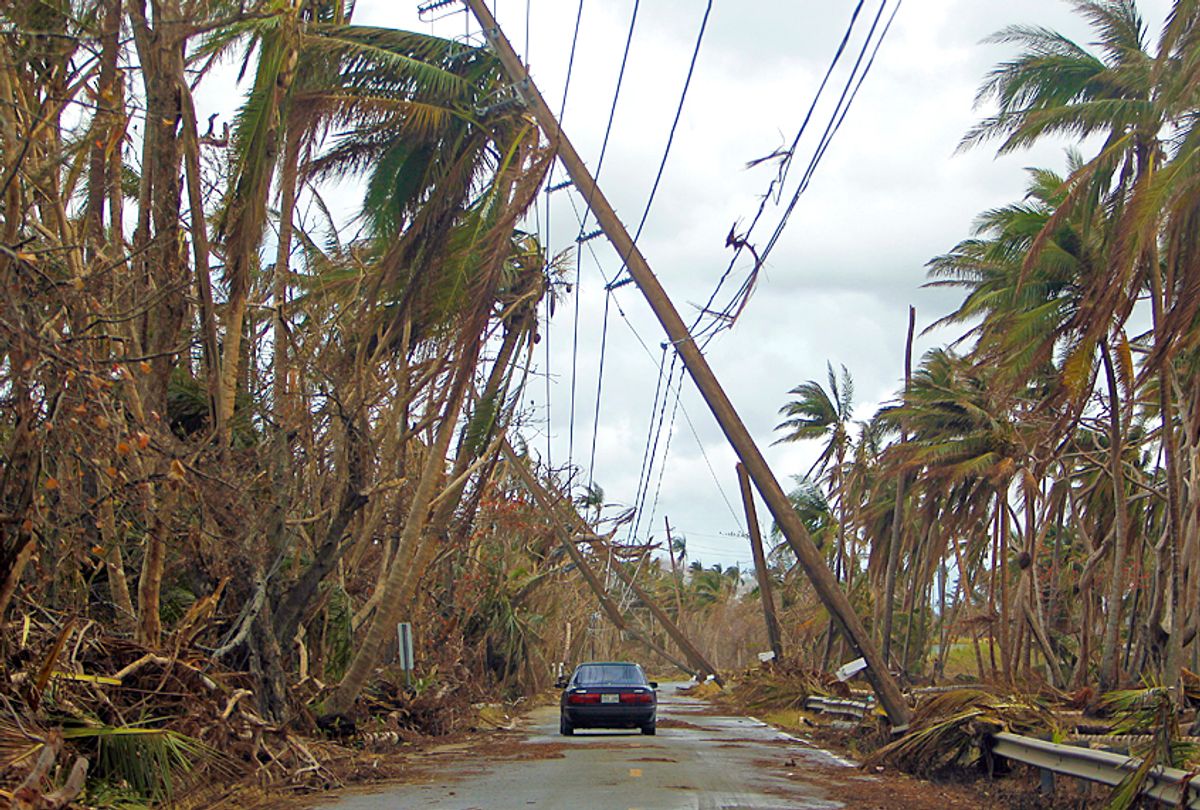Since Hurricane Maria battered the island of Puerto Rico, President Donald Trump has spent most of his time either insulting the mayor of the island's capital over Twitter, downplaying the damage, touting his administration's relief efforts, or chastising the island for having too much debt and costing too much in federal relief efforts.
On Friday morning, however, Trump made a superficial attempt to pledge his support for Puerto Ricans a day after he publicly whined the day before about having to help the many who are suffering.
"The wonderful people of Puerto Rico, with their unmatched spirit, know how bad things were before the H's. I will always be with them!" Trump tweeted.
The wonderful people of Puerto Rico, with their unmatched spirit, know how bad things were before the H's. I will always be with them!
— Donald J. Trump (@realDonaldTrump) October 13, 2017
But the hollow voice of support from the president — a day after he complained that he didn't want the federal government to be helping Americans for too long — wasn't the only insult from the administration in the past 24 hours.
Energy Secretary Rick Perry referred to Puerto Rico as its own country on Thursday during a House Energy and Commerce subcommittee hearing, the Washington Post reported.
When asked what his plan was on repairing their energy grid and how he planned "to build a more distributed grid there with the modern technology that's at our fingertips," Perry replied, "You have just pointed out the real challenge that this country faces in dealing with the territory and the citizens of Puerto Rico."
He added, "That is a country that already had its challenges before this storm," but was cut off by Rep. Kathy Castor, D-Fla.
"Well, they're — it's America. They're American citizens, so it's not a country," she explained. Perry then apologized for his mistake.
While gaffes certainly happen this specific instance provides a glimpse into the subconscious of how Americans have often viewed the people of Puerto Rico.
Thankfully, a recent poll showed that 55 percent of Americans believe Trump hasn't done enough to help Puerto Rico in its time of need, the Post reported.
This is especially true considering the president has expressed substantially more empathy and support for the people in Florida and Texas when they were hit with deadly hurricanes.
"TEXAS: We are with you today, we are with you tomorrow, and we will be with you EVERY SINGLE DAY AFTER, to restore, recover, and REBUILD!" he tweeted on Sep. 2, even though he Tweeted on Thursday that he can't help Puerto Rico forever.
When the House voted on an aid package for disaster relief to the recent hurricanes and wildfires across the country, including Puerto Rico, a total of 69 Republicans voted against the package because many didn't want to rack up more debt and increase the deficit.
Mark Walker, R-N.C., took out an entire op-ed in the Wall Street Journal to explain his decision in which he began by issuing do-nothing prayers for the victims.
"There was no way to foresee the havoc of Hurricanes Harvey, Irma, Maria and Nate. Each storm was devastating to those affected, and Americans are praying for healing and recovery," Walker wrote, despite a scientific consensus that climate change is linked to the increased intensity of natural disasters.
He added, "Hurricane aid shouldn’t be added to the debt. That’s akin to going to the Emergency Room after an injury, putting the charges on a credit card, and then pretending that the Visa bill is never going to arrive."
An overwhelming majority — roughly 84 percent — of Puerto Rico still remains without power. But while some Republicans, as well as the Trump administration, have made national debt and deficits the focal point of the conversation — instead of ensuring assistance to those who are suffering — it means absolutely nothing.
On Thursday the White House announced it would deliberately end subsidies provided to health insurance companies under Obamacare, which the Congressional Budget Office has predicted would make the budget deficit soar "by $6 billion next year, $21 billion in 2020 and $26 billion in 2026 as low- and moderate-income Americans make more use of tax credits to offset rising premiums," NBC News reported.



Shares